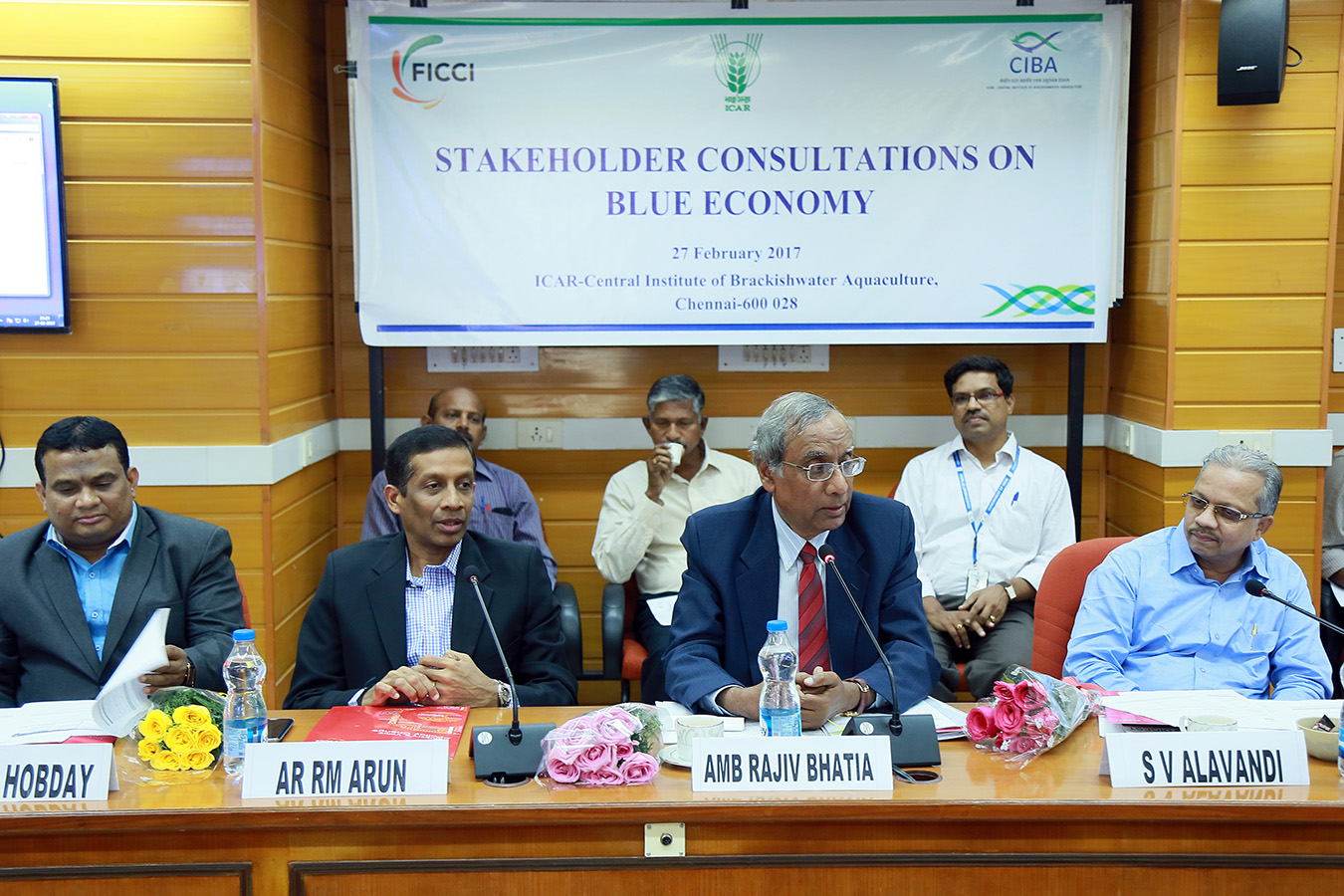As a part of India’s Business Engagement with Indian Ocean Rim (IOR) countries, Industry stakeholder consultation on Blue economy was conducted jointly by FICCI and ICAR-CIBA on 27th February 2017 at Chennai. This was an initiative by the FICCI task force on Blue Economy to build the economic connect with the IOR. The programme was initiated with welcome remarks by Mr.Ar Rm Arun, Chairman-FICCI-Tamil Nadu State Council & Chairman, Valingro Group. In his opening remarks, Former Ambassador Mr. Rajiv Bhatia chairing the consultation, consultation apprised the gathering about the objectives highlighting on blue economy as a business opportunity incorporating sustainable ways for ocean based trade. The objective of the task force was to explore investment and economic activity, examine issues of doing business with IOR countries, provide recommendations for enhancing business in priority sectors, and connecting with Sagarmala initiative, by Govt of India. The key areas include fisheries and aquaculture, biotechnology, mining, minerals, renewable energy, manufacturing, shipping, ports and maritime, logistics, tourism and leisure, construction, ICT, education and research. Dr. S.V. Alavandi, HOD, AAHED CIBA presented the bird’s eye view of CIBA’s research activities towards the goal of blue economy and future programmes envisaged with special reference to brackishwater aquaculture, under the FICCI taskforce. He highlighted the potentials areas CIBA could offer technology back up for IOR countries for achieving blue economy. Dr.T. Ravisankar, from technology management unit of CIBA highlighted on rich marine biodiversity, aquaculture potential and related business in the IOR and fish trade flow from IOR countries. He indicated that fine-tuning production technologies by collaboration among IOR countries was necessary for improving fish production and aquaculture, and IOR countries can even control global fish prices as they produce major share of global fish exports. Prices of aquaculture produce in IOR countries were brought down because of the competition within the region and benefited developed countries, hence the co-operation among the IOR countries could change the market dynamics for higher export prices and improving the economy in the region.
The participants shared their views in relevance to sectors such as fisheries and aquaculture and biotechnology, tourism, renewable energy, shipping, ports and maritime logistics etc. Dr. M. Sakthivel, Founder, Aquaculture Foundation emphasised that with limited land resources, coastal waters and sea had enormous potential for production of aquaculture and mariculture with production of fish, sea weeds, biodiesel and bio-fertilizers using natural resources, potable deep seawater supply and tidal energy. Also there is need to have special focus on coastal aquaculture, fish processing activities and to train and educate local fisheries community. Ban on sharks, sea cucumbers and price fluctuations were also discussed. It was felt that tourism in the form of surfing, snorkelling, gaming and including local fishermen and women with eco-tourism in marine parks will contribute to blue economy. Drugs from marine chemicals and hydrocarbon extraction were also discussed. Issues of fishermen crossing boundaries for want of better fish catch were highlighted. Banning purse seine / mesh size regulation along with sea ranching and Potential Fishing Zones with ISRO/INCOIS were also suggested as remedies.
Mr. Murari, IAS (retd) Advisor to FICCI and Govt in his concluding remarks mentioned that there was urgent need for cold chain, upgradation of deep sea fishing vessels especially for tuna fishing, improving fishing vessels’, energy efficiency, vessel building and preventing wastage of small size and lesser valued fish getting discarded in seas by deep sea fishermen. The Chairman indicated that considering the importance of fisheries sector, there was need to conduct a national level consultation on fisheries sector, where FICCI could play a major role in bringing institutions and stakeholders together. Representative stakeholders from industry, state and central Government and research organizations, universities and farming community took part in the meeting.




